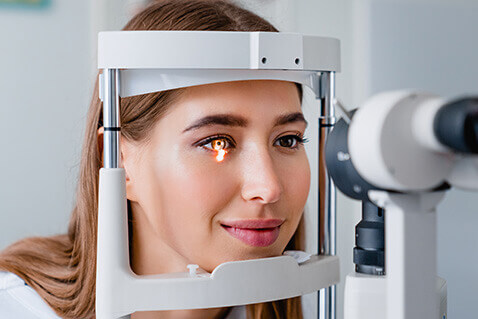
Many eye diseases can develop unnoticed over a long time. This is because your brain can fill in gaps in your sight, so you don’t notice any symptoms. It is adept at creating full, uninterrupted images for long periods. When your brain can no longer fill in the blanks, your vision could be more impaired than expected. Often, by the time visual symptoms occur, your eyesight may already be permanently damaged.
The doctors at Lee Eye Center use state-of-the-art technology to not only diagnose eye problems, but up to two hundred and fifty systemic diseases as well. They can diagnose most eye conditions before they cause vision loss. Most eye conditions are treatable with diagnosis and monitoring by your eye doctor. Halting their progression or at least slowing it down is usually possible.
Without regular eye exams, your eye doctor cannot track your eye health. This makes diagnosis challenging.
Cataracts are one eye condition that develops slowly. Often, they begin to form in your forties or younger but don’t cause vision loss for decades.
Your eye doctor can track the progress of cataracts during regular eye exams. Then they can tell you when it is time to have cataract surgery.
Glaucoma may be the biggest reason for regular eye exams. The most common type develops for a long time without any symptoms.
Then, when symptoms appear, it’s too late, and your vision is permanently damaged. Once this happens, you can only slow the progression of the disease and maintain what sight you have left.
If glaucoma develops too long, it can cause complete vision loss. Total vision loss is preventable, though.
Your eye doctor can track the pressure in your eyes, called IOP if you have an eye exam at least once a year. They diagnose glaucoma by comparing your current IOP to your baseline IOP.
Eye pressure will be high before glaucoma causes vision loss. Eye exams are the only way to know if you have it or not.
Macular degeneration affects the macula, which handles your central vision. It allows you to recognize faces and see color.
Macular degeneration causes weak or blurry central vision and other visual distortions. Smoking, obesity, and age, among other factors, may contribute to it.
Your eye doctor can see damage to your macula during an eye exam. Then they can help you form a plan of action to slow the progress of the degeneration.
Diabetic retinopathy is an eye condition caused by complications from diabetes. Diabetes weakens your blood vessels, especially in your retina.
As they weaken, they can leak, which can disrupt your vision and cause bleeding and retinal detachments. A retinal detachment can cause vision loss and requires rapid treatment.
New retinal blood vessels may also grow if you have diabetic retinopathy. These are also weak and create many of the same problems.
If you have diabetes, you should see your eye doctor at least once a year. They can track the effects of diabetes on your eyes and treat any issues to limit the damage.
Medications can prevent new weak blood vessel growth. Medical intervention can save your eyesight if you have diabetic retinopathy.
The best way to maintain your eyesight is by seeing your eye doctor regularly. Schedule an appointment at Lee Eye Center, to ensure your vision is safe!